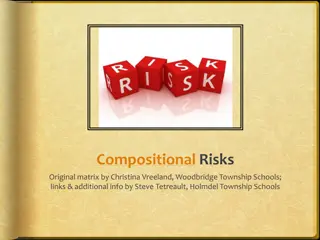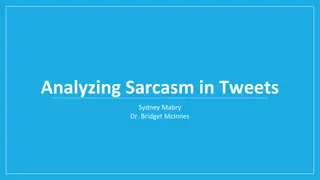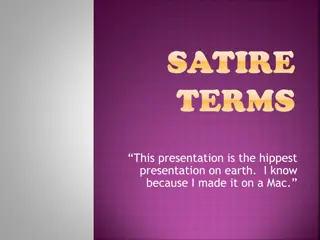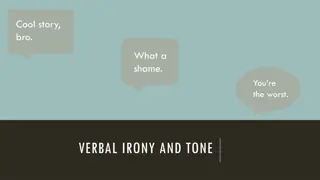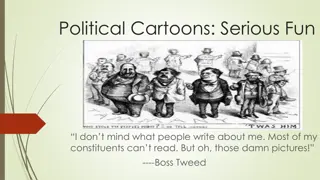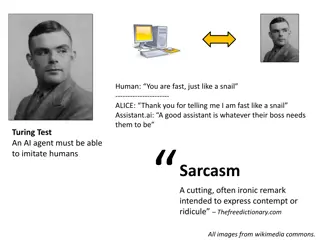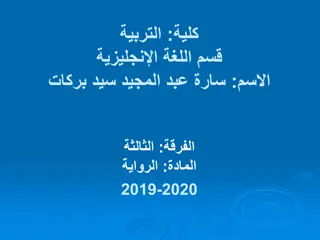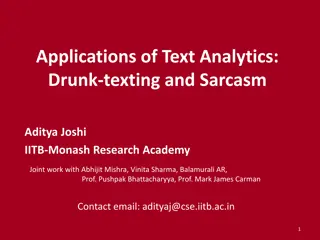Understanding Compositional Risks in Writing
Explore the concept of compositional risk in writing, where authors strive to create engaging and unique content. Learn about the risks writers take to captivate readers, from using voice, repetition, and figurative language to incorporating humor, sarcasm, and surprise elements. Discover how quirki
2 views • 24 slides
Unveiling the World of Comedy: An In-Depth Exploration
Embark on a journey through the diverse realms of comedy and humor, discovering the art of satire, parody, puns, and more. Learn to decipher the nuances of hyperbole, sarcasm, and slapstick comedy, and delve into the world of stereotypes and situational irony. Unleash your inner comedian, impress yo
1 views • 12 slides
Decoding Sarcasm in Tweets: A Comprehensive Analysis
This research delves into the realm of sarcasm detection in tweets, utilizing a dataset of sarcastic and non-sarcastic tweets to build a model for classification. Through methods like feature extraction and model building with WEKA, the study aims to enhance the understanding of sarcasm detection on
0 views • 9 slides
Unveiling the Art of Satire: Types and Techniques
Delve into the world of satire with this presentation exploring the types of satire such as Juvenalian and Horatian, along with elements like hyperbole, incongruity, and reversal. Discover how satire is used as a literary technique to mock human vices and learn about the humor and criticism it conve
0 views • 15 slides
Understanding Verbal Irony and Tone Through Examples
Verbal irony is the expression of words conveying the opposite of their literal meaning. It is not the same as lying and is used to emphasize a point. Tone plays a crucial role in conveying irony, as it can affect how the message is perceived. Sarcasm, though related, has a negative agenda of mockin
0 views • 7 slides
Understanding Political Cartoons: A Satirical Art Form
Political cartoons use humor and satire to convey messages, often poking fun at politicians and societal issues. They employ various techniques like caricature, symbols, metaphors, irony, sarcasm, and stereotypes to make powerful statements. These cartoons can influence public opinion and spark disc
0 views • 8 slides
Computational Sarcasm: Understanding, Generating, and Detecting Sarcasm in AI Agents
The emerging theme of Computational Sarcasm explores the nuances of understanding, generating, and detecting sarcasm in AI agents. This involves using incongruity within text, sentiment annotation complexity, and emotion engines to develop sarcasm-enabled chatbots. Various approaches such as rule-ba
0 views • 5 slides
Analysis of Narrative Techniques and Character Development in Pride and Prejudice
Jane Austen's novel, Pride and Prejudice, employs a third-person omniscient narrator to provide insights into character perspectives, particularly focusing on Elizabeth Bennet. The narrative techniques reveal different viewpoints and character depths, while the character analysis of Mr. Bennet showc
0 views • 10 slides
Applications of Text Analytics: Drunk-texting and Sarcasm
Drunk-texting and sarcasm are explored through text analytics in a collaborative research project by Aditya Joshi and team. The study delves into predicting drunk-texting behavior and identifying sarcasm in text. Additionally, the content covers the continuous learning process of humans, child langu
0 views • 49 slides
